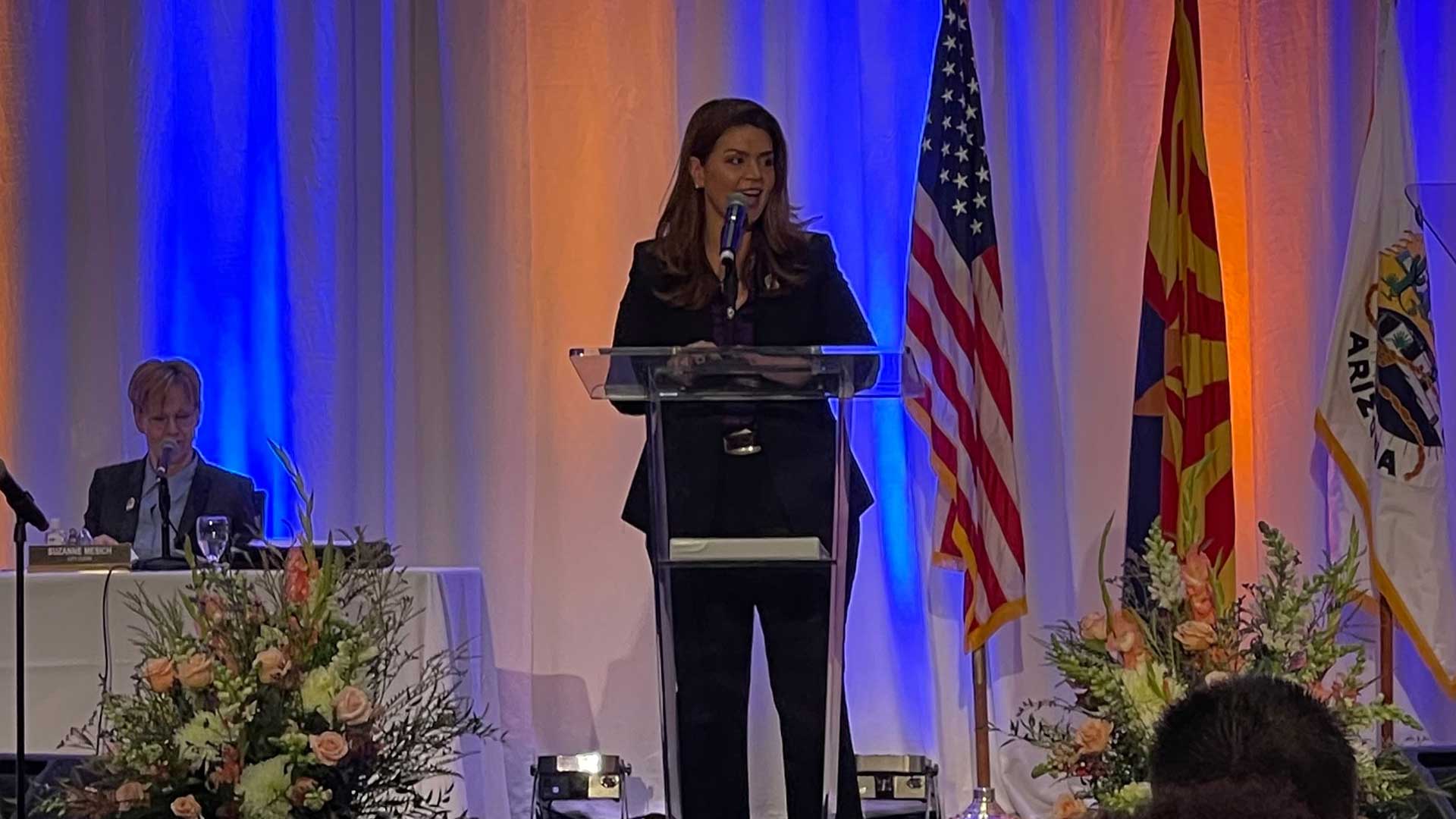 Tucson Mayor Regina Romero delivers her annual State of the City address on Monday, Dec. 4, 2023 at the Tucson Convention Center in Tucson, Ariz. Mayor Romero was re-elected Nov. 7.
Tucson Mayor Regina Romero delivers her annual State of the City address on Monday, Dec. 4, 2023 at the Tucson Convention Center in Tucson, Ariz. Mayor Romero was re-elected Nov. 7.
Regina Romero officially accepted the challenge of a second term as Tucson’s first Latina mayor in her annual State of the City Address on Monday, Dec. 4.
The newly re-elected mayor called attention to the city’s successes in public safety, climate change adaptation, and housing to a packed ballroom at the Tucson Convention Center.
She took her oath of office alongside three city council members, including Lane Santa Cruz of Ward 1, Paul Cunningham of Ward 2, and Nikki Lee of Ward 4. All three Democrats and Romero swept the Nov. 7 election.
Council Member for Ward 3 Kevin Dahl was unanimously voted as Vice Mayor for 2024 after the council was sworn in. Councilmembers Steve Kozachik and Richard Fimbres were absent due to illness.
According to Cunningham, Dahl is the only council member who hasn’t yet served as Vice Mayor, which prompted the council’s nomination. He also said the wards have worked together to redefine the position of Vice Mayor moving forward.
According to Mayor Romero, 2023 was full of accomplishments in climate change, public safety, and affordable housing for the city.
Public Safety
She specifically called attention to Tucson’s success in combating gun violence after it became one of six pilot cities for the Place Network Investigation program this year.
Romero said the three selected areas, Grant and Alvernon, Campbell and Bilby, and 22nd and Prudence, have seen a 75% reduction in gun violence. The program began in 2021.
“This increased collaboration and investment is having a tangible, positive impact on the quality of life for our community,” she said.
The 311 non-emergency line was also deployed in January. Romero said the city handled over 9,000 calls in November, and it has been successful in easing the strain on emergency services in its first year.
“Before, the city had over 280 phone numbers for residents to call to access city services. Now, a single number, 311, is available 24 hours a day, seven days a week that connects residents with the right information or the right service,” she said.
Of those 9,000 calls, Romero says 70% were handled immediately, and the remaining 30% were referred to a city department for follow-up.
Climate
Climate change was also a major running point for Romero’s first campaign in 2019. In her address, she reiterated that equitable climate policy remained a priority in 2023.
In June, the City hired its first Chief Resiliency Officer to help Tucson put its climate adaptation plan, called Tucson Resilient Together, to work.
One of those climate successes involves public transportation. The mayor announced plans to phase out the city's remaining diesel bus fleet and replace them with natural gas-powered vehicles, thanks to a $21.4 million grant.
Romero also applauded the city’s water use.
“We are using the same amount of water today that we did in 1985, Even though our population has doubled.”
Housing
The mayor also presented data on the city’s efforts to aid the housing crisis, including an update on the Housing First program.
According to Romero, the city has reduced police officer calls to homeless encampments by over 60% and over 650 people have been moved into permanent housing with the help of city services. The city also received multiple federal grants that helped low-income housing projects like the Tucson House.
“Mike Edmonds, a resident of the Tucson House, said this shows the city truly cares about Tucson House residents, and that they haven't been forgotten,” Romero said.
Looking ahead, Romero said a new 75 million dollar affordable housing program is coming in 2024 and hopes to make home ownership easier for families by lowering interest rates and providing down payment assistance.
As 2023 wraps up, Romero told constituents that she accepts the challenge of a new year, and she’s looking forward to four more.

By submitting your comments, you hereby give AZPM the right to post your comments and potentially use them in any other form of media operated by this institution.